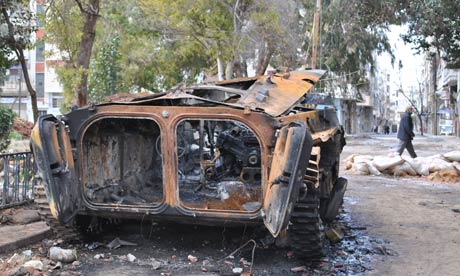Russian military presence in Syria poses challenge to US-led intervention http://buff.ly/TkryQq
1:09 PM - 24 Dec 12 · Details
Russian military presence in Syria poses challenge to US-led intervention
Advisers deployed with surface-to-air systems bolster President Assad's defences and complicate outcome of any future strikes

Syria crisis – an Assad regime military vehicle destroyed by rebels during clashes in Bayada neighborhood, Homs province. Photograph: Associated Press
Russian military advisers are manning some of Syria's more sophisticated air defences – something that would complicate any future US-led intervention, the Guardian has learned.
The advisers have been deployed with new surface-to-air systems and upgrades of old systems, which Moscow has supplied to the Assad regime since the Syrian revolution broke out 21 months ago.
The depth and complexity of Syria's anti-aircraft defences mean that any direct western campaign, in support of a no-fly zone or in the form of punitive air strikes against the leadership, would be costly, protracted and risky. The possibility of Russian military casualties in such a campaign could have unpredictable geopolitical consequences.
Meanwhile, near-daily atrocities have kept western governments under pressure to act. A Syrian government air strike on a town near the central city of Hama on Sunday killed dozens of civilians queueing for bread, according to human rights activists.
Amateur footage from Halfaya showed mangled human remains strewn along a street where people had been blown off scooters and out of cars. One video showed a boy with his feet blown off. Piles of corpses could be seen beneath rubble outside a two-storey building the cameraman described as a bakery. It was unclear how many bodies were in the smoking ruins.
Human Rights Watch has previously accused the regime of targeting bakeries. The group warned the Assad regime that such targeted bombing of civilians represented war crimes. However, in the face of a Russian veto at the UN security council, the international criminal court has not had a mandate to investigate the atrocities committed by either side. The UN has put the death toll at more than 40,000 as the war continues to escalate.
Turkish officials, who accurately predicted the Syrian regime would use Scud missiles after several warplanes were shot down by rebels, also believe President Bashar al-Assad has twice come close to using chemical weapons including sarin, the nerve gas. First, after the bombing of the regime's Damascus security headquarters in July, which killed the president's brother in law, Assef Shawkat, and then last month, after opposition forces made significant gains.
The Turks and western officials say there are signs Assad sees chemical weapons as another step in the escalation of force, rather than a Rubicon-crossing gamble that could end his regime. The US, UK, France and Turkey have warned Syria that its use of such weapons would trigger military retribution. But any such a response would be fraught with difficulties.


 The Guardian
The Guardian